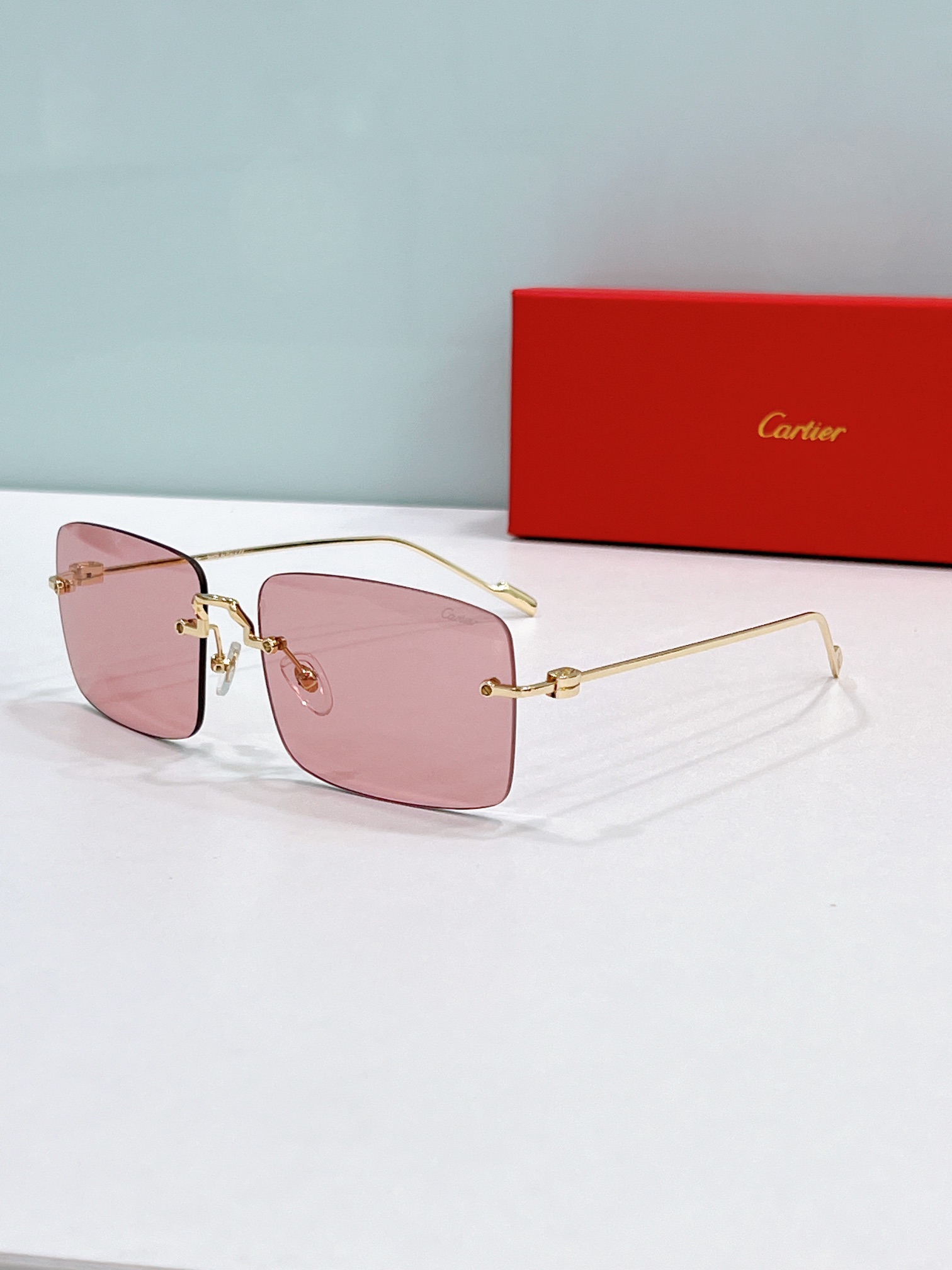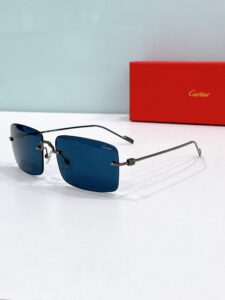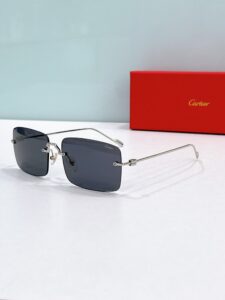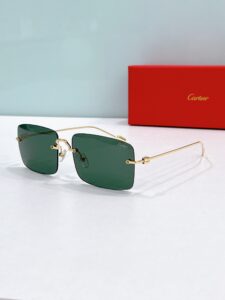Introduction to Replica Sunglasses
Replica sunglasses are imitation versions of designer eyewear that aim to emulate the style and appearance of authentic brands without the associated price tag. Unlike genuine sunglasses, which are manufactured by brand-name companies and often come with a guarantee of quality, replicas are typically produced by third-party manufacturers that do not possess the rights to use the original trademarks or designs. This distinction forms the basis of the ongoing debate surrounding the legal and ethical implications of replica products in the fashion industry.
The appeal of replica sunglasses among consumers can primarily be attributed to their affordability. With rising living costs and the prominence of fast fashion, many individuals are drawn to replicas as a cost-effective way to keep up with current trends without compromising their budget. Additionally, social media and celebrity endorsements often showcase a plethora of styles, leading consumers to seek similar looks at a fraction of the price. The allure of owning fashion items that reflect one’s personal style is thus met with the accessibility afforded by replica products.
Furthermore, the market presence of replica sunglasses has expanded significantly in recent years. Online platforms and e-commerce websites offer a vast selection of replicas, allowing consumers to explore various designs and styles at a click of a button. This unrestricted access has fostered a culture where imitation is not merely tolerated but often celebrated. Such developments prompt crucial considerations pertaining to intellectual property rights, consumer protection, and the authenticity of fashion, which invites a deeper examination of both the legal ramifications and the ethical responsibilities of all stakeholders involved.
Understanding Intellectual Property Rights
Intellectual property rights (IPR) offer crucial legal protection to the fashion industry, shielding innovations, designs, and brand identities from unauthorized duplication and exploitation. In the context of replica sunglasses, two primary forms of intellectual property rights are particularly relevant: trademark and copyright laws. Trademark laws primarily protect the symbols, logos, and brand names that distinguish a company’s products from competitors. Infringement occurs when counterfeit items bear similar markings that could confuse consumers about the authenticity of the product, thereby violating the rights of the original brand owner.
Conversely, copyright laws protect original works of authorship, which can extend to certain aspects of fashion design, including unique patterns, fabric designs, and artistic elements associated with sunglasses. While not all design elements qualify for copyright protection, those that exhibit sufficient originality may be safeguarded from unauthorized reproductions. For instance, a distinct visual design on a pair of sunglasses could constitute a copyrightable work, offering legal avenues for the brand to pursue against those manufacturing or selling replicas that infringe upon their rights.
The legal framework surrounding the sale of replica sunglasses is complex and varies by jurisdiction. Brand owners frequently pursue legal action against manufacturers and sellers of counterfeit products, often seeking injunctions to halt sales, monetary damages, or statutory damages under relevant laws. As a result, brands must actively monitor the market for potential infringements to enforce their rights effectively. The implications for consumers are significant, as the purchase of replica sunglasses not only undermines the financial viability of legitimate brands but also raises ethical concerns regarding the support of responsible and sustainable fashion practices. Understanding these intellectual property rights is essential for both brands and consumers navigating the intricate landscape of fashion and accessories.
Legal Consequences of Selling Replica Sunglasses
The sale of replica sunglasses presents a multitude of legal challenges for individuals and businesses involved in such activities. At the forefront are the risks of intellectual property infringement, specifically pertaining to trademark and copyright laws. Many manufacturers of sunglasses invest substantial resources into their branding, designs, and marketing strategies. When a person or business sells replica sunglasses, they typically exploit these established brands’ intellectual property without authorization, which can lead to serious legal ramifications.
One of the most common legal consequences is the potential for lawsuits from the original brand owners. These lawsuits can seek various forms of compensation, including damages that represent lost profits and legal fees. For instance, a well-known case involved a seller who was sued by a prominent sunglasses manufacturer for distributing replicas online. The court ruled in favor of the trademark holder, resulting in significant financial penalties for the seller, demonstrating that engaging in the market for counterfeit goods can yield unfavorable financial outcomes.
Additionally, the legal framework governing replica sunglasses may include local, state, or federal regulations that impose fines or criminal charges on sellers. For instance, in some jurisdictions, selling counterfeit merchandise can be classified as a criminal offense, resulting in possible imprisonment or hefty fines for repeat offenders. The implications extend beyond just financial penalties; a criminal conviction can also tarnish an individual’s or business’s reputation, affecting future opportunities.
The risk of legal repercussions is further compounded by the global nature of trade. Sellers of replica sunglasses may unknowingly violate international laws, leading to broader consequences, including the seizure of goods at customs and regulatory scrutiny. In summary, the sale of replica sunglasses can expose individuals and businesses to significant legal risks, highlighting the importance of understanding intellectual property laws in the marketplace.
The Role of Customs and Border Protection
Customs and Border Protection (CBP) plays a critical role in regulating the importation of goods, including replica sunglasses. As counterfeit items can severely impact legitimate businesses and consumer safety, CBP employs various strategies to identify and seize these unauthorized products. When items are brought into the country, customs officers utilize a combination of visual inspections, advanced technology, and intelligence data to detect potential counterfeits. Their training enables them to recognize distinguishing characteristics of genuine products, helping them differentiate between authentic items and replicas.
The importation process involves clear protocols that customs officials must follow. Upon arriving at a port of entry, goods are subject to random or targeted inspections based on risk assessment models. If a shipment of sunglasses is suspected to be counterfeit, officers will examine the packaging, labels, and any accompanying documentation. If the sunglasses are determined to be replicas, the legal ramifications can lead to immediate seizure of the goods, and in some cases, fines or penalties for the individual attempting to import these items.
The broader implications extend to consumers as well. While individuals may purchase replica sunglasses with the intent to save money, they often overlook the potential risks involved. Confiscating goods at customs not only results in financial loss for the consumer but can also lead to legal ramifications, depending on the jurisdiction and the nature of the violation. Furthermore, with strict enforcement against such imports, consumers are advised to remain vigilant and informed about the products they purchase for travel. Understanding these regulations can help protect against the unintended consequences of attempting to transport counterfeit goods across borders.
Ethical Considerations of Wearing Replica Eyewear
The decision to wear replica sunglasses is laden with ethical implications that extend beyond mere aesthetics. Consumers must consider how their choices impact original designers and brands, ultimately shaping the fashion industry. Whereas replica eyewear may be perceived as a budget-friendly alternative, it inherently supports a market rife with intellectual property theft. By choosing replicas, individuals inadvertently endorse practices that can undermine the creativity and economic stability of legitimate designers.
Intellectual property laws are designed to protect the unique designs and branding of creators, ensuring that their innovations receive the recognition and financial reward they deserve. When consumers opt for inexpensive replicas, they may be contributing to a cycle where original designers struggle to compete with cheaper alternatives, thereby stifling innovation within the industry. This behavior raises questions about consumer responsibility and the values reflected in their fashion choices.
Additionally, the act of wearing replica sunglasses can influence perceptions of one’s social status and values. Individuals may gravitate towards clones in a bid to emulate luxury brands without incurring the associated costs. However, this choice may convey a lack of respect for originality, authenticity, and the hard work that goes into producing quality fashion items. It invites contemplation on whether such choices align with one’s personal values, as they may inadvertently promote environments where creativity is undervalued.
Ultimately, the ethical considerations surrounding replica eyewear compel consumers to reflect on their purchasing habits. Each decision creates an impact rippling through the industry, leading to broader implications for fashion culture. By valuing original designs over replicas, consumers not only support the creators but also reinforce a marketplace that celebrates innovation and authenticity.
Consumer Perceptions and Attitudes towards Replica Sunglasses
Replica sunglasses have garnered significant attention in recent years, particularly concerning consumer perceptions and attitudes. One of the most compelling factors influencing these perceptions is affordability. Many consumers view replica sunglasses as a cost-effective alternative to high-end brands, enabling access to trendy styles without the financial burden associated with purchasing genuine products. This affordability often entices individuals who may be unable or unwilling to invest in expensive sunglasses, leading to an increased popularity of replicas in the marketplace.
Brand loyalty plays a crucial role in shaping consumer attitudes towards replica sunglasses. Established brands often cultivate a strong emotional connection with their audience, which can sometimes lead to a dismissive view of replicas. However, this loyalty can be challenged by the allure of replicating popular styles at a fraction of the price. Recent surveys have indicated a growing divide between those who prioritize brand allegiance and those who prioritize affordability. Interestingly, some consumers may opt for replica sunglasses even in the context of brand loyalty, suggesting a nuanced approach to brand perception within this demographic.
Authenticity is another critical aspect influencing consumer attitudes. Many individuals consider authenticity not solely in terms of the brand but also regarding the quality and craftsmanship of the product. While replicas may offer visual similarities to original sunglasses, concerns often arise about their durability and functionality. This perception can significantly impact purchasing decisions, as consumers may feel hesitant about the long-term value of a replica compared to an original product.
Studies have shown that public attitudes towards replica sunglasses are complex and multifaceted, with the interplay of affordability, brand loyalty, and authenticity shaping purchasing behaviors. As consumers become increasingly aware of the ethical implications associated with replicas, these perceptions may evolve, influencing brand reputation and market dynamics in the long run. Understanding these factors will be paramount for manufacturers and retailers alike as they navigate the competitive landscape of eyewear.
Alternatives to Replica Sunglasses
In a market inundated with replica sunglasses, consumers may find it challenging to prioritize both style and ethical considerations. However, there are numerous legitimate alternatives that offer a balance of affordability, quality, and ethical production practices. Budget-friendly eyewear brands have increasingly emerged to cater to the needs of style-conscious individuals without the ethical dilemmas associated with counterfeit products.
Brands such as Warby Parker and Sunglass Hut provide a range of fashionable eyewear at moderate prices, ensuring accessibility without compromising on integrity. These companies often emphasize transparency in their manufacturing processes and engage in social responsibility initiatives, ensuring that their products are both stylish and ethically produced. Furthermore, by choosing to invest in these legitimate alternatives, consumers not only acquire quality sunglasses but also support responsible business practices.
Another noteworthy option in the eyewear market is the rise of ethical fashion brands that prioritize sustainability and ethical labor practices. Companies such as Toms or MATT & NAT offer stylish eyewear collections made from eco-friendly materials. These brands incorporate sustainable practices into the entire production process, appealing to consumers who are increasingly concerned about environmental impact. By selecting sunglasses from these reputable brands, individuals can feel good about their purchase while staying on trend.
Ultimately, the decision to choose quality over replicas opens up opportunities for consumers to express their individual style without endorsing counterfeit culture. When searching for a new pair of sunglasses, it is crucial to consider the implications of the purchase not only for personal style but also for the broader ethical landscape. By prioritizing legitimate brands, consumers can find fashionable alternatives that respect both their budgetary constraints and ethical convictions, paving the way for more responsible consumption habits.
The Future of Replica Sunglasses in Fashion
The landscape of replica sunglasses in the fashion industry is anticipated to undergo significant transformations in the forthcoming years. As consumer awareness evolves, so does the acceptance of replicas, with many individuals increasingly drawn to affordable alternatives to high-end designer eyewear. This shift illustrates a growing trend, where consumers prioritize style and affordability, often over brand reputation. This phenomenon could lead to substantial changes in how fashion houses position their products in relation to replicas.
Emerging trends in design are also expected to influence the future of replica sunglasses. As advancements in technology continue to simplify the manufacturing process, replica designs may become more sophisticated, closely mirroring their original counterparts. Additionally, innovative materials that enhance durability and comfort may further blur the lines between authentic and replica sunglasses, compelling consumers to reconsider the implications of their purchasing decisions.
Moreover, as replica sunglasses gain traction, there may be a shift in legal regulations. Authorities might respond to the increasing proliferation of replicas through stricter enforcement of intellectual property laws. This could potentially create a more challenging environment for manufacturers of replica products, leading to a retraction in the availability of certain styles. Conversely, such regulations could foster a renewed advocacy for original designers, prompting consumers to appreciate the craftsmanship and artistry of authentic eyewear.
In this evolving context, the fashion industry might witness the emergence of more selective consumer choices, encouraging greater discernment when it comes to supporting original designers versus replicas. Consequently, the dual perspective on this issue highlights the complexities of the object in question, with implications extending beyond mere consumer preference to include broader societal and ethical considerations that continue to shape the dynamics of fashion as we know it.
Conclusion: Navigating the Fine Line
The intricate relationship between the legal and ethical implications of replica sunglasses requires careful consideration from multiple perspectives. On one hand, the legality of replica sunglasses often hinges on factors such as trademark infringement and intellectual property rights. While some jurisdictions may tolerate the sale of these items under flexible interpretations of the law, many countries impose strict regulations that protect brand identities and discourage counterfeit goods. This legal framework aims to uphold the interests of designers and brands while also ensuring consumer safety. However, the ethical implications raise deeper questions about authenticity, consumer responsibility, and the implications of supporting knockoff products.
From an ethical standpoint, purchasing replica sunglasses poses a dilemma. Consumers may view these products as budget-friendly alternatives that allow for stylish fashion choices without the hefty price tag associated with genuine brand items. Yet, this decision can inadvertently support a market that undermines the hard work of designers and artisans who dedicate their time and talent to creating original works. The perception of value shifts, allowing the proliferation of the counterfeit industry, which often disregards fair labor practices and sustainability considerations.
As consumers, it is paramount to navigate these complexities with awareness and mindfulness. One’s purchasing decisions should reflect personal values and the potential impacts on the wider fashion ecosystem. By choosing to support authentic brands and fostering an appreciation for craftsmanship, individuals can contribute positively to the industry while also emphasizing the importance of ethical consumption. In this context, exploring the nuanced implications surrounding replica sunglasses encourages a thoughtful approach to fashion, ultimately allowing consumers to make informed choices that align with their values. Greater awareness about the consequences of our purchasing behaviors could lead to a more responsible and ethically sound approach to fashion consumption.



